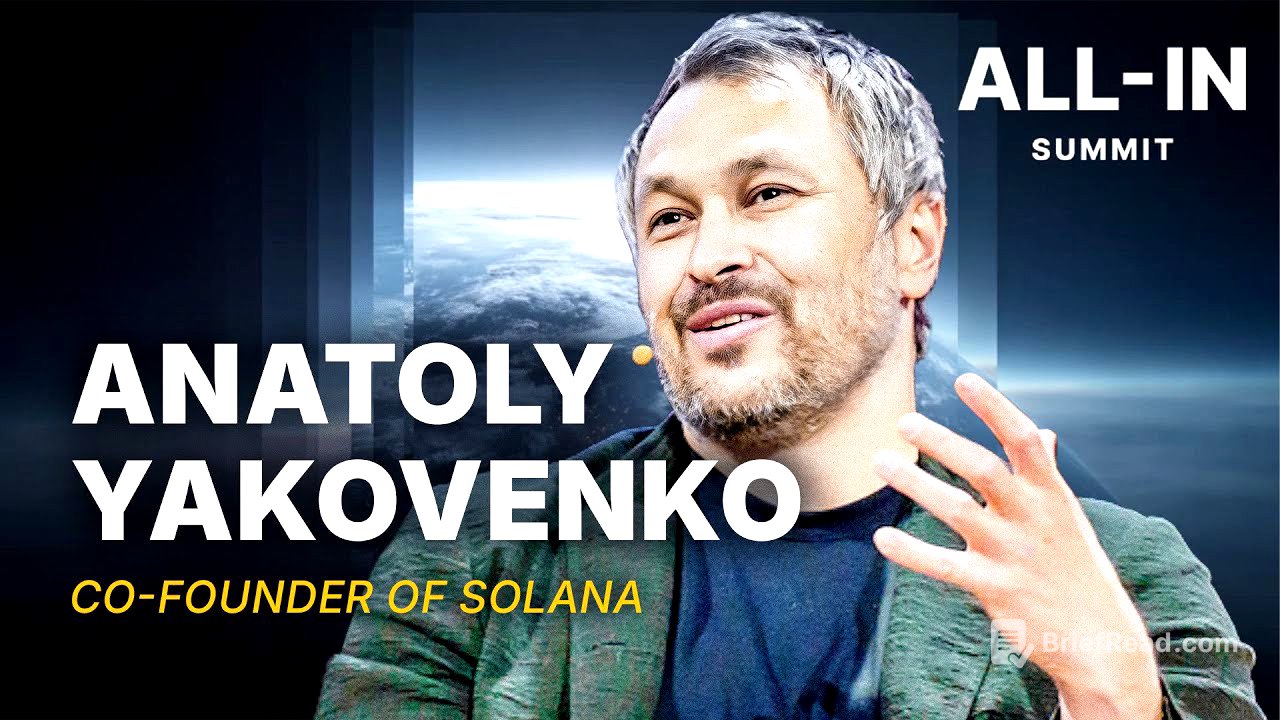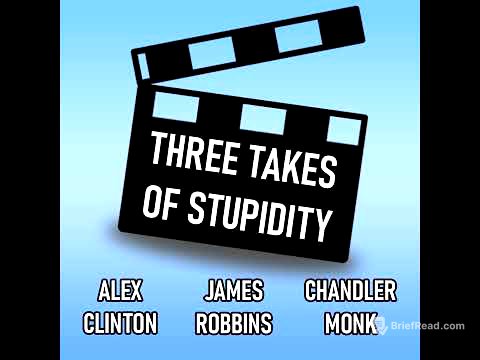TLDR;
Anatoli Yakavenko, CEO of Solana Labs, discusses the potential of crypto, Solana's role as an execution layer, and the future of finance with the All-In Podcast. He touches on the impact of regulation, the challenges and opportunities in the crypto space, and the intersection of AI and crypto. Yakavenko also shares his thoughts on Bitcoin, Ethereum, and the potential disruption of traditional financial systems.
- Crypto's inevitable win and its potential to transform finance.
- Solana's vision as a global execution engine.
- The need for regulatory clarity to foster innovation.
- The potential for crypto to disrupt traditional finance.
- The intersection of AI and crypto.
Introduction [0:00]
Anatoli Yakavenko, the CEO of Solana Labs, is introduced as a driver of Web 3 innovation. Solana is described as one of the fastest-growing blockchains globally, and its adoption by BlackRock for its tokenized money market fund is highlighted. The potential of crypto to revolutionize finance is emphasized, setting the stage for a discussion about Solana's role and the broader implications of cryptocurrency.
Impact of Crypto Regulation [0:55]
Anatoli discusses the positive impact of David Sachs as a crypto advocate, contrasting it with previous regulatory challenges. He highlights the potential of the Genius Act to unlock trillions of dollars in stablecoins on public permissionless chains, potentially leading to the internet becoming a major holder of US treasuries. Anatoli emphasizes the opportunity for the US to accelerate innovation and expand its financial influence globally through crypto, viewing it as a new technology stack aligned with Western values of transparency and capitalism.
Solana's Technical Vision [2:51]
Anatoli shares his vision for finance in the future, imagining a single, globally synchronized ledger accessible in major cities worldwide with minimal latency. He explains that Solana was built to address the latency issues in existing systems like Ethereum, positioning it as a high-speed execution layer. While Ethereum focuses on settlement, Solana aims to provide fast execution capabilities, which Anatoli believes is where the real value lies.
Challenges and Opportunities in Crypto [4:56]
Anatoli expresses his concerns about memecoins and the idea of a crypto strategic reserve, noting that regulatory delays have led to the proliferation of these projects instead of the intended focus on real-world assets. He discusses the potential for regulated exchanges like NASDAQ to integrate blockchain technology, balancing their regulatory advantages with the nimbleness and global reach of disruptors like Solana. Anatoli emphasizes that Solana is a protocol that anyone can use, including NASDAQ, to improve efficiency and accessibility.
Mass Adoption of Crypto [8:01]
Anatoli addresses the complexity of crypto and the challenges of mass adoption, comparing it to the early days of the internet when concepts like web links were difficult for people to understand. He believes that as stablecoins become more integrated into back-office operations, people will develop a better understanding of cryptography and digital ownership. Anatoli also discusses the proliferation of Layer 1 and Layer 2 projects, attributing it to the massive opportunity to become the "Google of finance."
Future Applications of Crypto [10:03]
Anatoli speculates on the future applications of crypto beyond finance, drawing parallels to the early days of the internet and predicting that current experiments with NFTs and community-driven content creation will eventually find success. He suggests that crypto could revolutionize social networks by providing new monetization mechanisms and reducing spam. Anatoli also touches on the potential for creators to raise funding through crypto and offer equity in their projects, contingent on regulatory changes.
Regulatory Clarity Act [13:36]
Anatoli explains the importance of the Clarity Act, which aims to reduce the legal costs and friction associated with launching tokens in the US. He shares his personal experience of spending a significant portion of seed funding on legal fees and emphasizes the need for clearer regulations to encourage innovation. Anatoli also discusses the movement to tokenize real-world assets, highlighting the demand for non-correlated assets in DeFi to improve risk management and hedging.
Quantum Computing and AI [15:58]
Anatoli shares his perspective on the state of quantum computing, estimating a 50/50 chance of a breakthrough within five years. He advocates for migrating Bitcoin to a quantum-resistant signature scheme and emphasizes the importance of Google and Apple adopting quantum-resistant cryptography. Anatoli also discusses the intersection of AI and crypto, acknowledging the difficulty of predicting specific applications but suggesting potential synergies in areas like distributed computing and AI agents.
Bitcoin's Resilience and Centralization [18:49]
Anatoli addresses concerns about the centralization of Bitcoin, noting that while it is resilient to collapses, increasing ownership by certain entities could pose risks. He emphasizes the importance of open global competition for acquiring Bitcoin and warns against regulatory restrictions. Anatoli also discusses the potential for state-sponsored attacks on Bitcoin and stresses the need to defend property rights and promote transparency in coin ownership.
Bitcoin's Design and Ethereum's Reanimation [22:04]
Anatoli praises Bitcoin's simple design and robustness, calling it the "coolest piece of software written in the last 20 years." He acknowledges that Solana is more complex due to its focus on hyper-performance. Anatoli also expresses his admiration for Ethereum and its founder, Vitalik Buterin, highlighting the different visions driving the two projects.
Disruption of Traditional Finance [23:31]
Anatoli shares his contrarian opinion that Visa and Mastercard are more like technology companies with low profit margins, while the issuer and receiver banks are more vulnerable to disruption due to their higher profit margins. He suggests that Visa could become more successful by removing banks from the loop and using stablecoin transfers behind the scenes. Anatoli concludes by humorously suggesting to "short the banks."


![[제40회 골든디스크] 디지털 음원 본상 - JENNIE (제니)](https://wm-img.halpindev.com/p-briefread_c-10_b-10/urlb/aHR0cDovL2ltZy55b3V0dWJlLmNvbS92aS9hVlpuYkJsZFdZUS9ocWRlZmF1bHQuanBn.jpg)

![Gosh, crab can puff !😳 [Video] | Funny animal videos, Cute funny animals, Funny animals](https://wm-img.halpindev.com/p-briefread_c-10_b-10/urlb/aHR0cHM6Ly9pLnBpbmltZy5jb20vNzM2eC81OS83ZS82MS81OTdlNjEzZTg5MDIxOTJmMzQyNGRlODY0NzEzYzFjZC5qcGc=.jpg)




